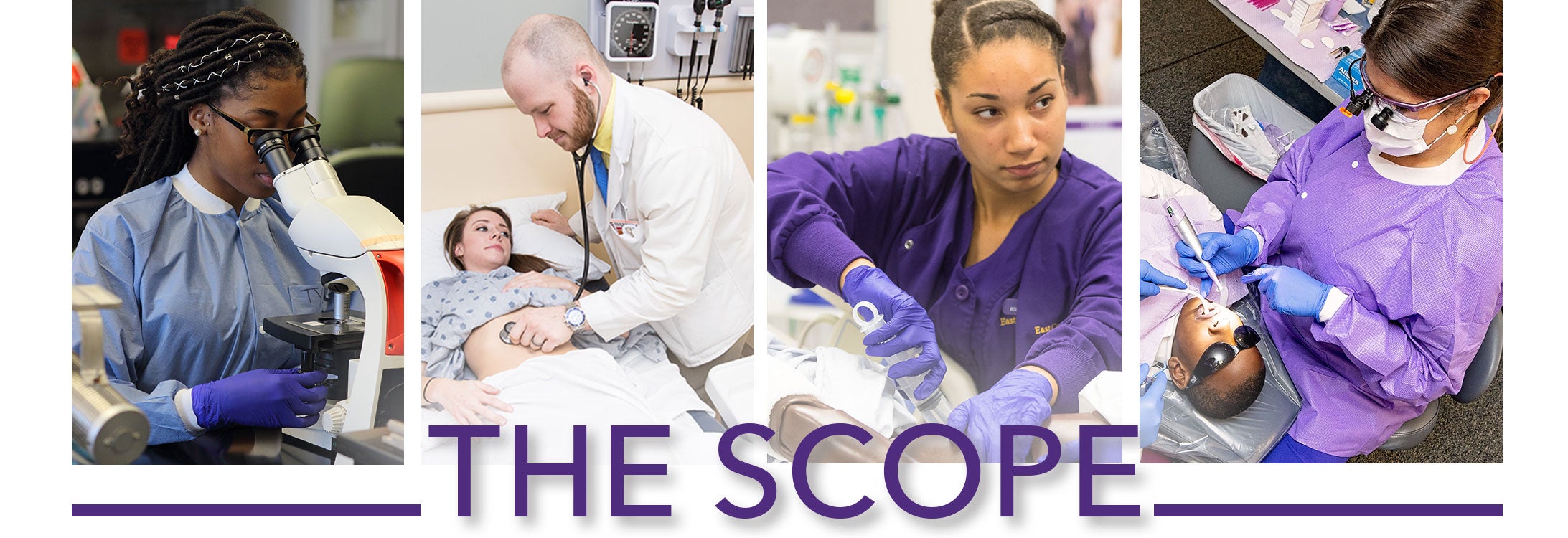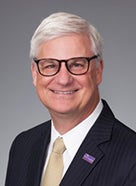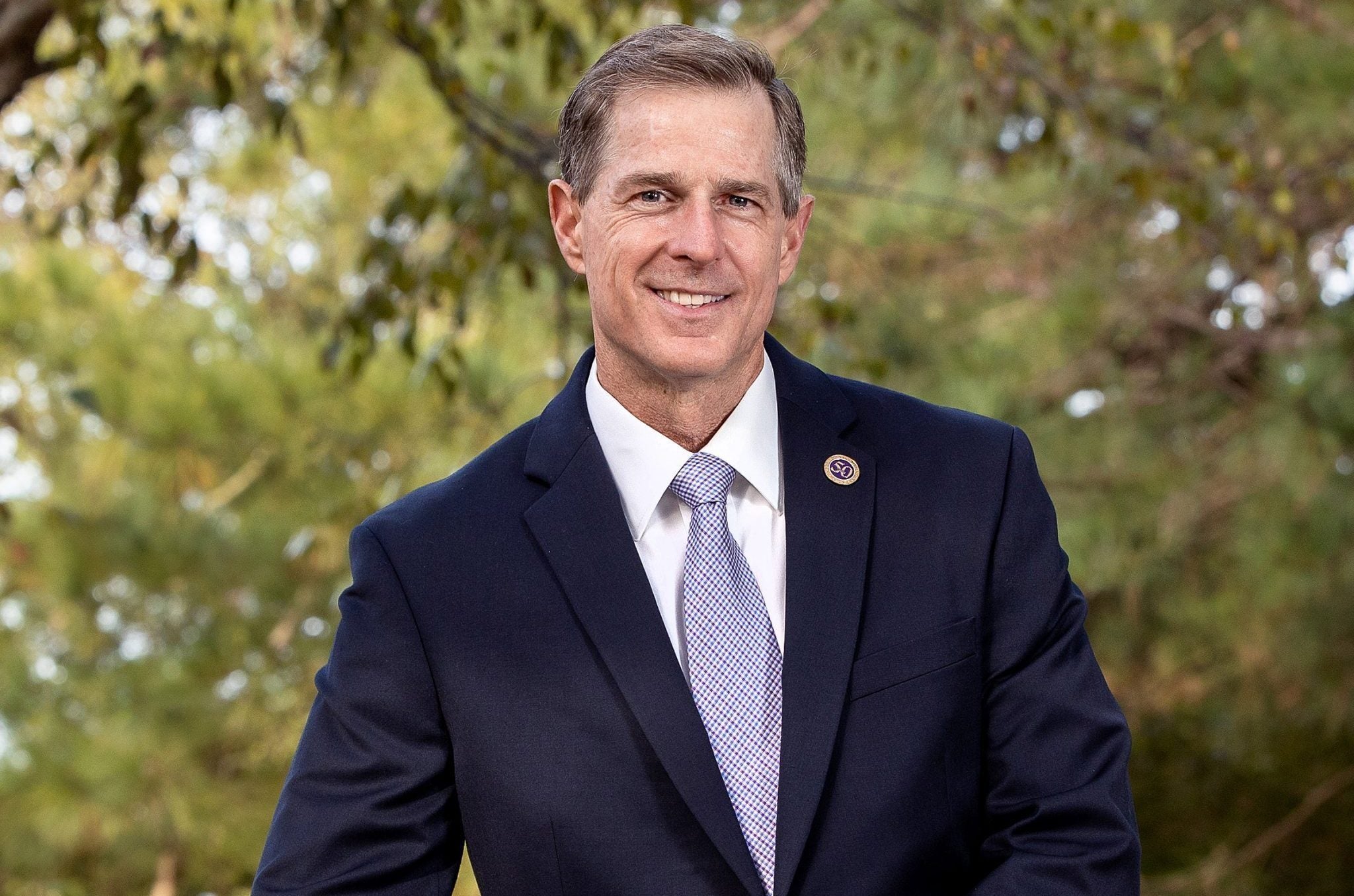January 2021
Welcome to “The Scope,” the newsletter of the ECU Division of Health Sciences.
Welcome to the January 2021 issue of The Scope, the newsletter of the ECU Division of Health Sciences.
With the start of any new year comes a clean slate, a time to take stock of successes and renew our resolve to discover enterprising solutions.
This year in particular carries over some of the most formidable challenges in health care that any of us have ever seen—and yet it is still appropriate to begin anew with positivity. We will do so using the lessons we learned last year to be more deliberate in our treatment of patients and in our treatment of each other.
There is still a long way to go in efforts to get the pandemic under control, but in the meantime, we should continue to support those caring for patients on the front lines, those embarking upon research that sharpens our understanding of the virus and all those working to keep classrooms, clinics and communities safe, informed and well.
We also have a responsibility to be good stewards of information, to be encouraged and encourage those around us to take advantage of the vaccine and to serve as good examples on campus and in our workspaces and communities.
I am grateful to you all for contributing to the local, regional, national and global efforts to combat the impact of COVID-19 and to continue making strides in your specific areas of expertise. The current circumstances have strengthened our connections with each other, emphasized the importance of interprofessional partnerships and accentuated the vitality of holding each other to accountability and dependability.
My hope for this year is that we feel and show an even higher level of respect for one another as we progress together toward the shared goal of health and wellness for those around us. From COVID to cultural and community strife, we are regarding each other on an ever more vital human level.
I implore each of you to view 2021 with a sense of possibility. Whatever your role in the Division of Health Sciences, do it with pride, energy and the knowledge that you are making a true difference. Consider where you are today and where you’ve been, just as where our students come from is equally as important as where they are going. Draw upon the very best traits within yourself that have helped carry you through this time of difficulty—and apply them tenfold.
Let us proceed together into a year we will look back on with pride.
Mark Stacy, MD
Dean, Brody School of Medicine
Vice Chancellor, Division of Health Sciences
Education
Students across the division resumed classes this month under safety guidelines, joining others already in action in class and clinical rotations.
At most other medical schools, students do not receive their white coats until a few years into their medical education. Because Brody School of Medicine students begin seeing patients in clinical areas sooner than their counterparts, incoming classes traditionally receive their white coats during a large ceremony at the end of orientation week. Last month, representatives from Brody’s Office of Student Affairs and ECU’s Medical & Health Sciences Foundation found a way to still make the delivery of the white coats special. After the students finished the final exam of their first semester, they were greeted by about a dozen people lining the roadway in front of the Brody Medical Sciences Building for a drive-thru White Coat Ceremony.
The ECU Health Sciences Leadership Council created a new healthcare-centric interprofessional case competition held last fall, bringing together teams of health professions students from across multiple schools and programs to develop and virtually present a proposed solution to a relevant issue in eastern North Carolina.

Nursing students, Selena Reyes, left, and Rachel Caputo pracitce inserting an IV in a nursing class in the CON January, 19, 2021. (ECU Photo by Cliff Hollis)
Six teams of 28 interprofessional students were asked to design an innovative and creative way to reduce the mortality rate related to heart disease in Perquimans County, particularly focusing on stroke. The winning team, “Stroke of Humanity,” was awarded $1,300 in total prizes and will have their names added to a plaque in the Health Sciences Student Center.
A recent article published by MedCityNews asserts that the Brody School of Medicine is a national leader in preparing the next generation of compassionate physicians, and that Brody shapes bright and talented students who are experts at providing a caring and positive patient experience. Throughout the article, the authors make the case for the importance of including compassion as a cornerstone of medical education.
The 11th Annual Student National Medical Association Conference was held virtually for its most recent session and provided middle and high school students as well as college undergraduates a closer look at careers in medicine. The simulation program was a featured session, during which medical students went through a simulated assessment of a possible COVID-19 patient. The scenario was broadcast live via WebEx for participants, who could ask questions in real time. Throughout the pandemic, the Clinical Simulation Center has implemented telesimulation, a simulation-based experience at a distance using video conferencing platforms to provide education, training and performance assessment to learners at off-site locations.
The College of Nursing recognized 13 nurses from hospitals and health care agencies throughout the state and beyond with the inaugural Preceptor of the Year honors. These preceptors educate students — spending more than 100 hours working with each student — in clinical areas, assigning tasks, overseeing their work and providing feedback to help each student grow. These clinical hours provide health sciences students with the real-world experiences that they will need to be able to navigate as they enter or advance in their field.
“There are people who have been preceptors for us for the past 15 years, and every single semester they’ll agree to take a student,” said Dr. Alta Andrews, ECU College of Nursing professor and director for community partnerships and practice. “The students and the faculty talk about how much they learn. When a student first arrives they are a novice, but the preceptors evaluate what they do well and what their learning needs are. Together they raise the competence level and help the students grow, so they gain confidence.”
Video of Same White Coat; Socially Distant “Ceremony”. Visit this video on YouTube for the closed-captioned version.
Patient Care
Division and ECU Physicians leaders have continued to work with university, state and federal guidelines to ensure providers, employees and students have access to the COVID-19 vaccine as soon as they are authorized to receive it. This month, ECU Physicians offered COVID-19 vaccines to all faculty, staff and students with direct patient contact, as well as all ECU faculty, staff and retirees who are age 65 and older – and their spouses who are age 65 and older – in accordance to the state of North Carolina’s current Phase 2 guidelines. Visit the ECU Physicians vaccine page for more information.
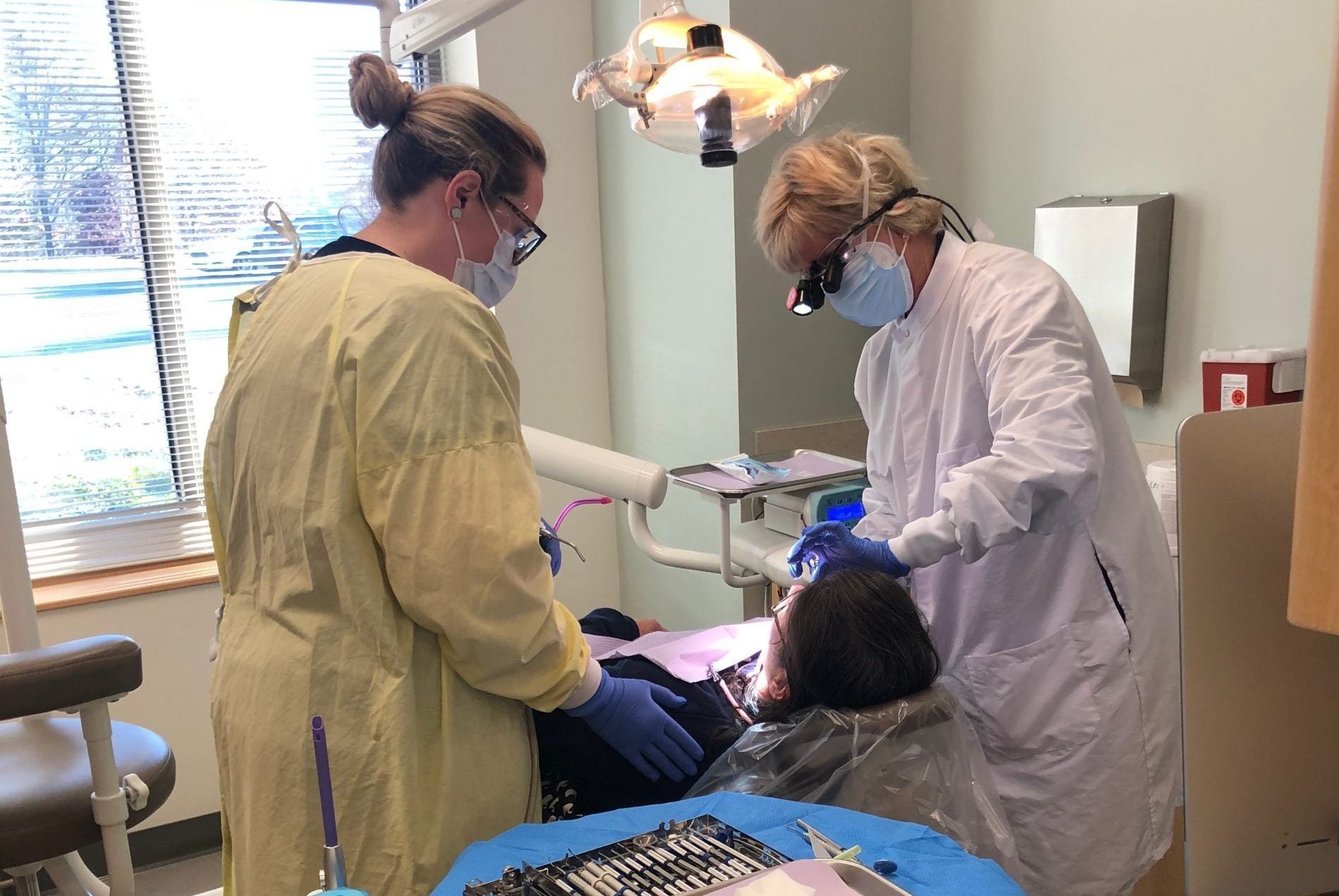
A grant from the Cape Fear Memorial Foundation will help patients with financial need receive care at the CSLC-Brunswick County.
A $50,000 grant from the Cape Fear Memorial Foundation will help people with financial challenges receive urgent and restorative dental care at the School of Dental Medicine’s community service learning center in Brunswick County. The School of Dental Medicine will use the Cape Fear Memorial Foundation grant to add to its current Patient Care Funds program, which is designed to help with costs of all procedures from a simple filling to a set of dentures. Urgent and restorative procedures can alleviate pain, restore teeth and improve patients’ smiles and overall health.
“This generous grant from the Cape Fear Memorial Foundation positions the ECU School of Dental Medicine to maximize its partnerships with county health departments and community agencies to improve oral health care access for all who need it,” said Dr. Greg Chadwick, dean of the dental school. “It will open doors to access for the people of southeastern North Carolina and will enable more patients with financial challenges to receive urgent dental care and restorative procedures that lead to better overall health.”
North Carolina Attorney General Josh Stein recently honored an ECU physician with a Dogwood Award for her devotion to caring for COVID-19 patients during the coronavirus pandemic. Each year, the Dogwood Awards honor North Carolinians who are dedicated to keeping people safe, healthy and happy in their communities.
Dr. Ogugua Ndili Obi, assistant professor at the Brody School of Medicine at East Carolina University and pulmonologist and critical care physician with Vidant Medical Center, was one of 26 recipients in the state to earn this recognition in 2020. Obi is a 1998 medical school graduate from the the University of Ibadan in Nigeria. She also graduated from Harvard University’s School of Public Health in 2003 with a Master of Science in Public Heath (MPH) degree and a Master of Science in Epidemiology (MSc) degree before completing her medical residency at ECU and Vidant Medical Center in 2006.
“Dr. Obi and her team have risked their own personal safety to bravely care for COVID-19 patients,” said Stein. “It is my honor to recognize Dr. Obi and all the medical professionals on the front lines of the coronavirus pandemic. Every North Carolinian owes a debt of gratitude to the health care professionals who are responding to this crisis.”
ECU and the other 14 research institutions in the UNC System will receive 61 new freezers capable of safely storing COVID-19 vaccines at temperatures as low as -80 Celsius (-112 Fahrenheit). The freezers will support state and local public health agencies, hospitals, and pharmacies with the critical logistics of sub-zero storage and subsequent distribution of COVID-19 vaccines. Vaccines stored at UNC System institutions will be distributed according to the State’s COVID-19 vaccine distribution plan at the direction of state and local public health officials. The new freezers, provided by the NC Policy Collaboratory at the University of North Carolina at Chapel Hill, will increase North Carolina’s total vaccine cold-storage capacity by 1.86 million two-milliliter vials.
Video of Getting Vaccinated at ECU. Visit this video on YouTube for the closed-captioned version.
Research
Dr. Shiv Patil, a family physician, diabetologist and faculty member at the ECU Brody School of Medicine, was named the recipient of the 2020 Health Care Provider Award from the North Carolina Diabetes Advisory Council. The award is given annually to recognize those who have demonstrated exemplary work in diabetes prevention and management. It is awarded to a hospital, clinic, health care organization or person in the health care field who has provided support in one or more of the strategies outlined in North Carolina’s Guide to Diabetes Prevention and Management.
“When it comes to a chronic disease like diabetes, managing it is not just a physician’s responsibility. We actually need a team — and that team involves the patient and their family as well,” Patil said. “We have our providers, leadership, dieticians, diabetes educators, pharmacists, nursing, patient access, and administrative staff, health coaches and researchers. I think we have a really good system here at ECU and in our Family Medicine Department.”
As baby boomers age, some are outliving their ability to drive. That’s why it’s important to have a transportation plan, and ECU occupational therapists are helping older drivers plan for continued independence — with or without a driver’s license. Dr. Anne Dickerson, professor of occupational therapy who has studied driving more than 25 years, believes vehicles mean much more to baby boomers than just transportation.
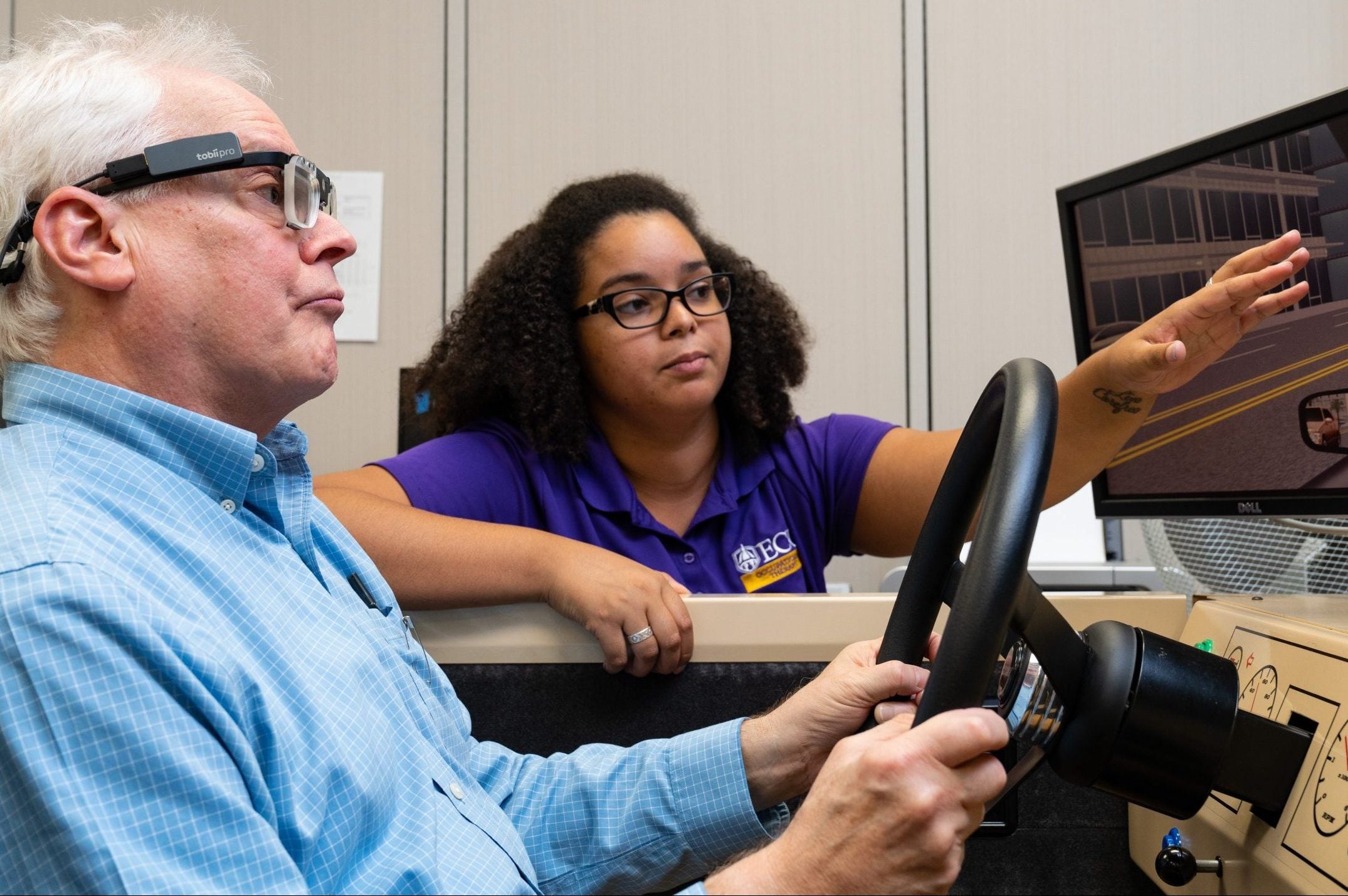
An ECU occupational therapy student works with a participant in the driving simulator in the College of Allied Health Sciences in 2018. (Photo taken pre-COVID-19 by Cliff Hollis)
While research shows drivers in their 60s have the lowest crash rates, fatalities increase with age, especially in drivers over 80. In a recent study by the Insurance Institute for Highway Safety, data showed that drivers in their 70s are now less likely to be involved in a fatal crash than drivers aged 35-54. While that’s good news, it’s important to plan for the future, when changes in eyesight or other medical conditions can result in a recommendation to restrict or cease driving, Dickerson said.
“The literature has shown that quality of life and participation in life roles decrease when older adults stop driving,” said Dr. Lynne Murphy, ECU assistant professor of occupational therapy, who is leading a study with older drivers on transportation planning. “We are hoping to help them develop a plan to continue to participate in valued activities and roles by using other means of transportation. We are hopeful that we can reduce that decline for older adults.”
An interprofessional education and collaborative research opportunity in the College of Allied Health Sciences brought faculty and students together to provide a writing workshop for children through the Speech-Language and Hearing Clinic. The “I Can Write!” program recently expanded to include the Departments of Communication Sciences and Disorders and Occupational Therapy. Students from both departments worked together with faculty to design interventions that would assist children and help researchers determine if the interventions and lessons held long-term benefits for the children.
Several departments across campus are collaborating to collect, process and analyze wastewater samples triweekly from residence halls in an effort to detect coronavirus as early as possible to reduce transmission and avoid outbreaks where students live.
Once collected, the composite samples are delivered to ECU’s environmental health sciences lab where Dr. Guy Iverson, Dr. Charles Humphrey and Avian White in the Department of Health Education and Promotion in the College of Health and Human Performance are working with students to process and prepare the samples for real-time polymerase chain reaction analyses. From there, the samples are delivered to Dr. Jay Fallon in the Brody School of Medicine Department of Pathology and Laboratory Medicine, whose team analyzes the tests.
Laupus Library presents: Virtual LOVE DATA WEEK, February 15-19. Love Data Week is an international event intended to engage researchers in dialogues around issues and methods in data creation, analysis, and visualization. Federal funding sources and private foundations are becoming more focused on the rigor and results of research, and data is more important than ever. From managing data to learning about the process of gathering information and applying data, Love Data Week’s virtual conversations will highlight resources, tools and training related to data and its issues and trends.
Sessions are open to ECU Faculty, Staff, and Students. No registration required. Email Mary Roby for Teams links.
DHS Spotlight
In the spirit of excellence in education and a collaborative campus, we will be highlighting a variety of students, staff and faculty who represent the colleges and schools in the Division of Health Sciences.
This month, we meet Dr. Greg Kearney, an associate professor in the ECU Department of Public Health in the Brody School of Medicine.
A temporary job turned into a lifelong passion for Dr. Greg Kearney.
“I fell into public health purely by accident,” said Kearney, who graduated from ECU with a degree in urban and regional planning in 1987. “After graduating from ECU, I needed a job and money, so I headed to south Florida and worked as a health inspector at a local health department. I thought it would be temporary, but I got very involved with a children’s cancer cluster in my community and it wound up changing the course of my life and career path.”
Kearney added a master’s and a doctoral degree in public health and worked in local, state and federal government. As an epidemiologist for the state of Florida and later for the Centers for Disease Control and Prevention’s National Center for Environmental Health in Atlanta, he gained experience in public health. A native of eastern North Carolina who lived in Rocky Mount and New Bern, among other places, Kearney returned to ECU nine years ago to become part of the fabric of the community and to help teach the next generation of public health leaders.
Kearney said those leaders are needed now more than ever.
“Up until the pandemic, I don’t think most people really understood the meaning or importance of public health. That has all changed,” Kearney said. “Like I tell my students, public health all boils down to one word — prevention. All the strategies to avoid COVID-19, such as social distancing, wearing masks, hand washing, vaccines, etc., are all forms of public health.
“It’s important that we continue to keep our public health students involved and at the forefront of events like the pandemic, so that they can learn and teach others how to avoid illness through prevention.”
As a researcher, Kearney is leading a group using Coronavirus Aid, Relief and Economic Security (CARES) Act funding on a COVID-19 surveillance project in the region.
Philanthropy
A new fund aims to provide resources for experts in the ECU Division of Health Sciences to study and treat COVID-19.
The new Pandemic Response and Research Fund was created to provide fast, flexible funding to ECU researchers and medical professionals across the Division of Health Sciences who are working on the prevention, detection, treatment and long-term impacts of the COVID-19 virus and its mutations.

Graduate student Melissa Nolan works in a water testing lab in the Belk Building. (Photo by Rhett Butler)
The fund will, in part, help the Brody School of Medicine continue research that was started with the $15 million from the CARES Act funding it received from the North Carolina General Assembly last year.
All of the schools and colleges across the division can seek funding for COVID-related projects.
“The university has already invested in a number of really great mission-focused research at the intersection of pandemic needs and Brody’s service goals,” said Dr. Pete Schmidt, vice dean of the Brody School of Medicine. “There were a number of things we were able to understand at the midpoint of the disease that we were not able to complete by the end of the CARES Act funding. This is a need, and a present need, but also a future need. A deeper understanding of the pandemic will help us to address health care more broadly.”
Learn more about how you can support the mission of ECU’s Division of Health Sciences through the ECU Medical & Health Sciences Foundation, Inc.
